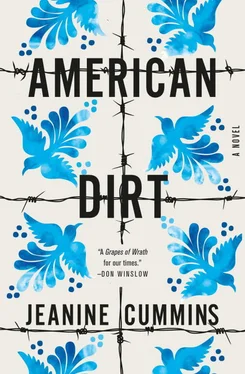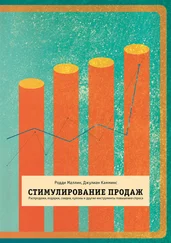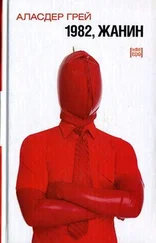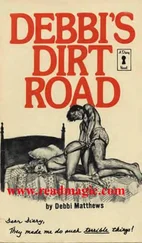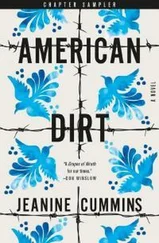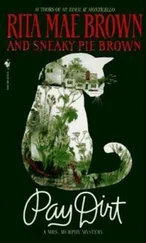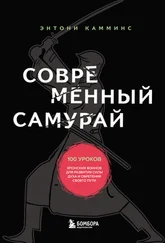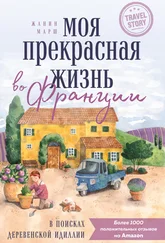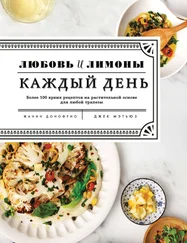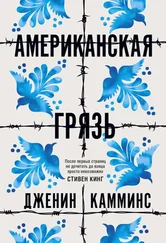Early the next morning, just as they’re discussing how and what to eat, the door opens, and Lydia buckles with relief when El Chacal descends the four steps, followed by two men and an older woman. He’s still here. He hasn’t abandoned them. This relief is soon followed by fear: Who are these people? Lydia watches them for clues, for recognition. The men seem to know each other. They are young and wear their baseball caps low over their eyes, talking quietly together while ignoring the others. Long sleeves and jeans hide any possible tattoos. Lydia experiences a trigger-wash of nausea, but it’s chased off by her hunger.
‘Don’t go far,’ the coyote says. ‘If you’re not here when it’s time to go, we won’t wait.’
It’s tense in the apartment after El Chacal leaves. The sisters and Luca retreat to the bedroom where they slept last night, and the new woman locks herself in the bathroom. Lydia wants to find out all she can about the newcomers, but she also wants to keep her distance, to remain imperceptible and vague. And anyway, she’s hungry. Luca is hungry.
‘Are you hungry?’ she asks the new men, who are seated on the couch.
They are.
‘I will cook, if you have money for food.’
She will make omelets. A warm morsel of familiarity for Luca. The men give her some pesos, and she and Luca set out to find a grocery store.
‘Wear your new boots,’ she tells him. ‘Let’s break them in.’
They’re only a half a block from the apartment when they hear someone calling out behind them.
‘¡Hola! Perdón, señora, ¡disculpe!’
Lydia turns with trepidation and finds the new woman from the apartment hurrying toward them. ‘I thought I might come with you if you don’t mind,’ the woman says. ‘I need to get a few things myself.’ She carries a purple handbag and is dressed as if going out for a nice meal: black trousers, an oversize blouse, and wedge sandals. She’s slim and dark-skinned with short-cropped hair, black with sparks of silver. A gold bracelet on one wrist is too understated to be fake. She looks nothing like a migrant, Lydia thinks, and then remembers that neither does she. Or at least she didn’t when first they embarked on this journey.
‘I’m Marisol.’ The bracelet dangles when the woman extends her hand for Lydia to shake.
‘Lydia.’
‘Mucho gusto.’
‘And this is my son, Luca.’
‘Hello, Luca!’
At the corner, an elderly gentleman sits in his doorway, and Lydia asks him to point the way to the nearest shop. He does.
‘I need to buy fruit,’ Marisol says as they walk. ‘I’m used to eating salad every day, and my stomach has been all messed up since I got back.’
‘Back?’ Lydia asks.
‘From California.’
‘Oh! You were in California already?’
‘Yes, sixteen years,’ she says. ‘I’m practically a gabacha now.’
They both laugh.
‘But then why did you come back?’ Lydia asks.
‘Not by choice.’
Lydia winces.
‘My daughters are still there, in San Diego.’ She reaches into a side pocket of her purse and draws out an iPhone with a shiny case. She unlocks it with her thumb and scrolls to a photograph of two beautiful young girls, perhaps close in age to Soledad and Rebeca. She shows them to Lydia proudly. The younger one is wearing a quinceañera dress.
‘That’s my Daisy,’ she says. ‘She wanted to wear a Chiapas dress for her birthday, even though she was born in San Diego. She doesn’t even speak Spanish!’ She closes the phone and returns it to her purse. ‘And my older one, América, she’s in college now, trying to take care of her younger sister, trying to take care of the house.’ Marisol’s voice sounds thick and tired.
‘How long have you been gone?’
‘Almost three weeks,’ Marisol says. ‘But I was in a detention center for more than two months before that.’ She shakes her head and presses her lips together in a gesture Lydia recognizes. It’s the one when you’re resolute about keeping your shit together despite the fact that your voice is quivering, and your chest feels cleaved with sorrow. Luca doesn’t seem to be listening, but Lydia knows better. He’s always listening now, walking a few steps ahead of them and watching the cars come and go.
‘What happened?’ Lydia asks.
Marisol takes a big breath before answering. ‘We went legally, when América was only four years old. My husband was an engineer – he had work there, so we got visas. And then Daisy was born, and years and years went by, you don’t even notice the time going by.’
Lydia finds herself instinctively drawing close to Marisol as they walk, up and down the sunny hillside streets, around corners, and through quiet intersections. Luca strides heavily in his new boots.
‘Then five years ago, Rogelio was killed, my husband was killed.’ Marisol blesses herself and Lydia gasps involuntarily.
‘I’m so sorry,’ Lydia says.
Marisol nods. ‘It was very sudden. A car accident as he was returning home from work.’
Something treacherous and unkind lurches up in Lydia – a jealousy almost, of that kind of widowing. A normal, ungruesome death. But then she follows it: Rogelio is no less dead than Sebastián. By the time she squeezes Marisol’s arm, her compassion is genuine again.
‘Our visas lapsed when he died. We were supposed to return home to Oaxaca. Only Daisy was permitted to stay because she’s a citizen.’
‘But that’s absurd,’ Lydia says. ‘She’s how old?’
‘Fifteen.’
‘Ay.’ She’s heard the stories, of course. But it’s different talking to a mother who’s actually living it. Lydia can’t imagine being separated from Luca, on top of all the other griefs. He’s there, walking just ahead of them, but Lydia has to fight the urge to lunge for him, to crush him to her chest.
Lydia’s always been a devoted mother, but she’s never been the codependent kind who misses her child when he goes to school or to sleep. She’s always treasured that time to herself, to inhabit her own thoughts, to have a break from the nonstop emotional clamoring of motherhood. There were even times in Acapulco when she’d experienced a sliver of resentment at the way he barged into her heart and mind whenever he was around, how Luca’s energy usurped everything else in the room. She loved that boy with her whole heart, but my God, there were days when she couldn’t fully breathe until she’d left him at the schoolyard gate. That’s all over now; she would staple him to her, sew him into her skin, affix her body permanently to his now, if she could. She’d grow her hair into his scalp, would become his conjoined twin-mother. She would forgo a private thought in her head for the rest of her life, if she could keep him safe. Luca waits at the corner, and Lydia looks beyond him, across the street, where the side of a building is painted with graffiti. A giant question mark. No. No, it’s not a question mark. Lydia stops cold. She puts her hand out for Luca.
‘Mijo.’
‘Are you okay?’ Marisol asks.
It’s not a question mark. It’s a sickle. And beneath the sickle, in fresh black paint, the slanted letters warn: Vienen Los Jardineros. Perched on the curved blade is an owl. La Lechuza . And then something new, something Lydia has not seen before: a perfect, faceless rendering of Javier’s distinctive glasses. The exact shape as to provoke in her memory the man himself. Where the lenses would be, someone has scrawled, Aún te está buscando . He is still looking for you.
For me. He is looking for me, Madre de Dios. Lydia turns on her heel. ‘Luca, come.’
‘But, Mami—’
‘Come!’ she snaps, her voice like a whip.
Читать дальше
